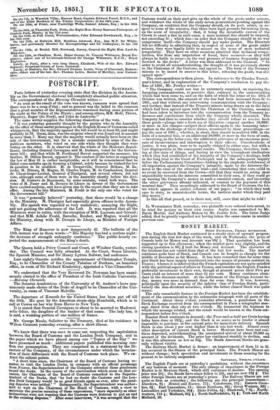POSTSCRIPT.
SATURDAY.
Paris letters of yesterday evening state that the division in the Assem- bly on the Government electoral bill completely absorbed public attention. The correspondent of the Morning Chronicle writes — " As soon as the result of the vote was known, rumours were spread that there was to be a coup d'etat ; and so general was the belief in the rumours that a great number of the Representatives remained during some portion of the night at the Palace of the Elysee ; and among others, MM. Mole, Thiers, Placatory, Roger (du Nord), and Jules de Lasteyrie."
The same writer supplies the following dissection of the vote.
" It was yesterday generally thought by the parties who in the Assembly do the office of those useful personages in the English House of Commons called whippers-in, that the majority against the bill would be at least 60, and might probably be 70. Great, then, was the surprise when it was found not to amount to more than 7. Many say that the majority would actually have been on the side of the Government, but for a mistake committed by some of the Re- publican members, who voted on one side while they thought they were voting on the other. It is observed that the whole of the Moderate Repub- licans, including General Cavaignac and M. Dufaure, voted for the Govern- ment bill ; and that while M. Ferdinand Barret supported the measure, his brother, M. Odilon Barrot, opposed it. The conduct of the latter in supporting the law of May 31 is rather inexplicable, as it will be remembered that he failed some months ago in forming a Cabinet, solely because he wished the law in question to be modified. M. de ToNneville, General Bedeau, M. Ba- roche, M. Bineau, M. Magus, M. Charles Dupin, M. de Cambaceres, General de Chasseloupe-Laubat, General d'Hautpoul, and several others, did not vote, although some of them were in the Assembly shortly before the divi- sion. M. Gustave de Beaumont, by some mistake, voted both ways. The votes of M. Passy and M. Drouyn de Lhuys in favour of the Government have excited surprise, and have given rise to the report that they are to take office. Among the late Ministers, M. Fould is the only one who voted for the Government bill."
It was "generally believed" yesterday, that there would be a change in the Ministry. M. Thorigny had especially given offence to the Assem- bly. His speech was regarded as very maladroit ; annoying the Right, and not gaining the adherence of the Left. It was reported that all the Ministers were to retire, with the exception of MM. Lacrosse and Gimud ; and that MM. Achile Fould, Baroche, Rouher, and Mane, would join the Ministry, along with M. Drouyn de Lhuys, as Minister of Foreign Affairs.
The King of Hanover is now dangerously ill. The bulletin of the 10th instant was in these words—" His Majesty has had a restless night : the decrease of strength unhappily continues." The public hourly ex- pected the announcement of the King's death.


























 Previous page
Previous page